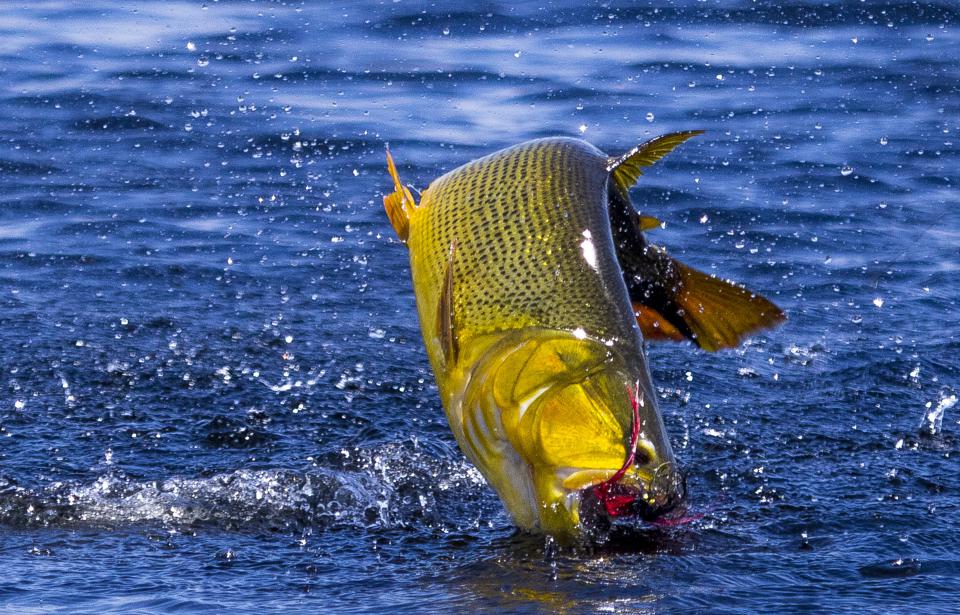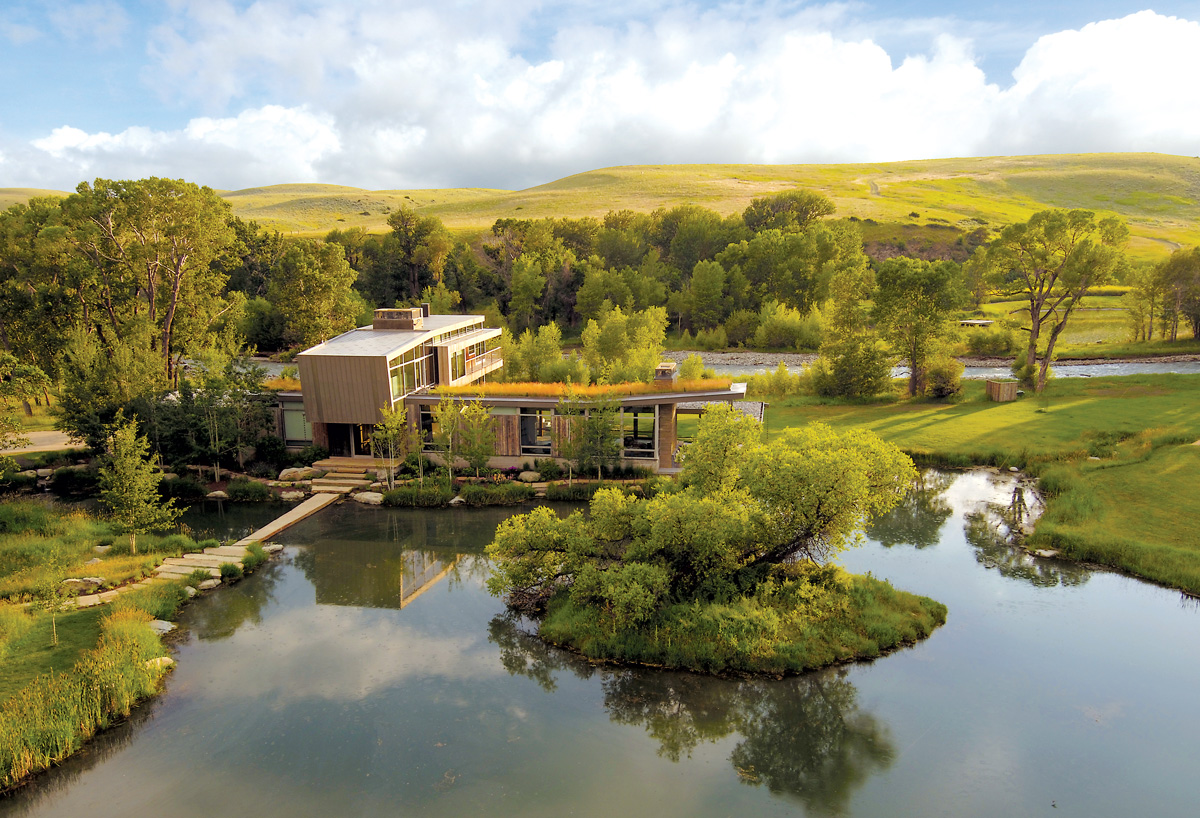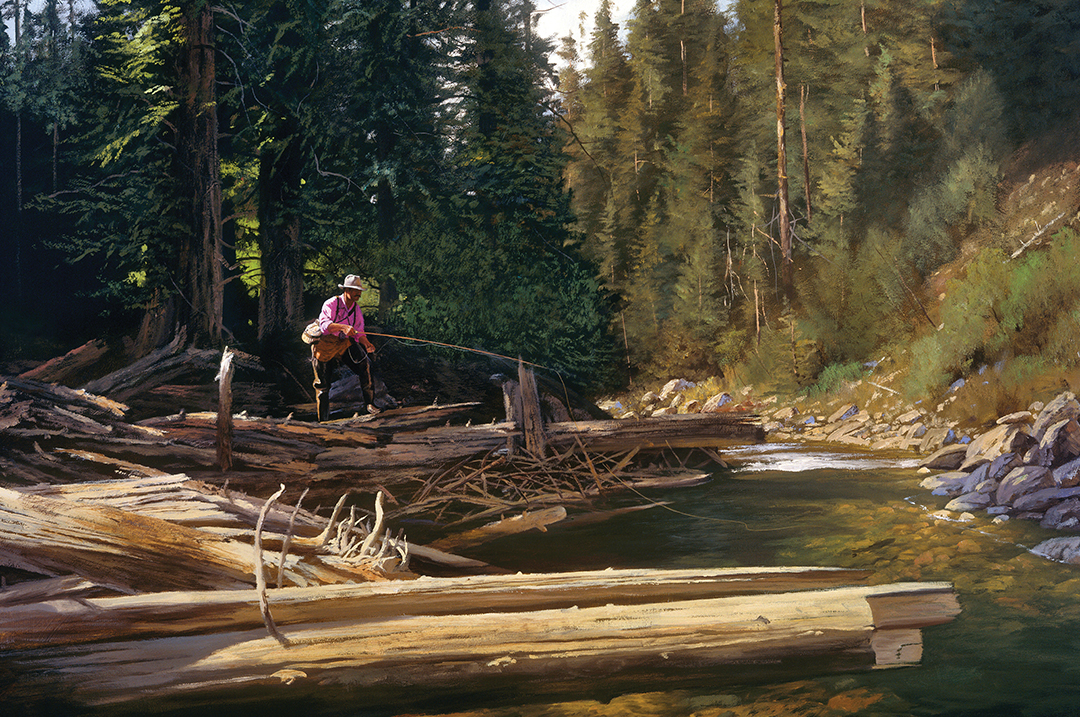Argentina’s vast Ibera Swamp is an other-worldly setting for one of the planet’s great game fish.
Argentina’s seemingly endless Ibera Wetlands span some 7,000-square miles, the second largest marshland in the world, behind only Brazil’s great Pantanal. It is a labyrinth of rivers, streams and pools that are the hidden lairs of notorious fly-stealing pirates known as golden dorado, pound for pound one of the hardest fighting fish in the world.
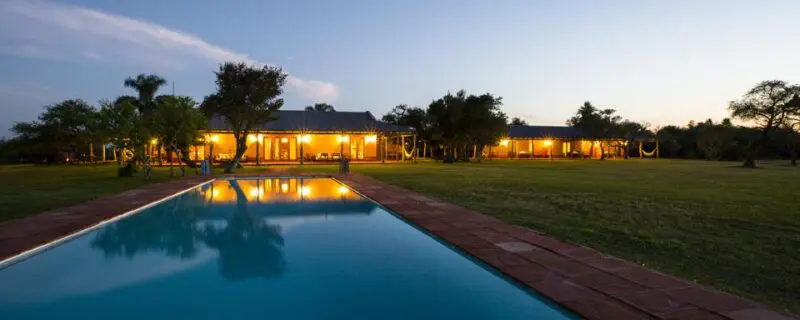
Located in Argentina’s 7,000-square-mile Ibera Wetlands, Pira Lodge provides luxury accommodations with gourmet dining…in the middle of nowhere. JOHN MACGILLIVRAY, DORSEY PICTURES
Old friend Matt Connolly and I have come to the end of the Earth to tango with these fish whose beauty belies their vicious nature. Our home base is Pira Lodge, part of the Nervous Waters collection of premium fly fishing lodges found across the globe. Baptizing us to golden dorado fishing is guide and South African Francois Botha. He is something of a trout bum who’s done good, for he’s parlayed his love of fishing into a living sampling the world’s best angling. He’s a high-energy ambassador for the sport and, like most South Africans I’ve met, will make his own party if he can’t crash one. He takes us through a series of channels and cuts in the marsh enroute to pools where he’s previously found good numbers of fish on his prospecting voyages.
Within 15 minutes of our journey, I am already disorientated to the point where he could have blind-folded me and it would have made little difference to my understanding of our whereabouts. In other words, if Botha suddenly had a widowmaker, Connolly and I would become nothing more than a missing persons cold case.
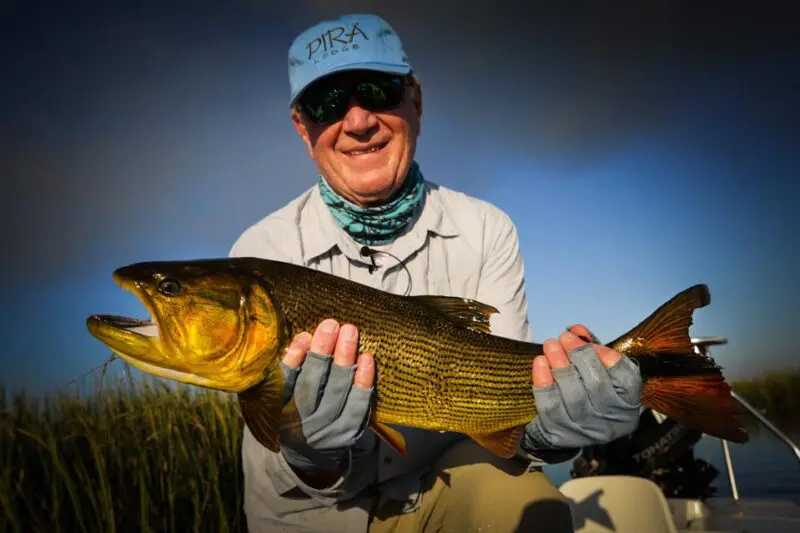
Matt Connolly is all smiles after landing a fish that made several long runs before finally being brought to the boat where it was released to fight another day. JOHN MACGILLIVRAY, DORSEY PICTURES
As we boat to our first dorado pool, we round bends in the channel that are lined with nearly black bear-sized capybaras, a South American beaver of sorts—they’re the largest rodents in the world. The wetlands also are home to all manner of exotic beasts including a trio of impressive cats: jaguars, puma and ocelots. Moreover, there’s an abundance of caiman, a South American alligator; anacondas; howler and spider monkeys; and the deadly fer de lance, a pit viper in the ‘two-stepper’ family of snakes owing to how quickly they kill. Then there is an incredible diversity of bird life, so much, in fact, that you feel as if a large percentage of the world’s supply of many of these species must surely reside here.
After the 45-minute wetland tour, we emerge into a series of pools that look like main street for golden dorado. Connolly is up and begins false casting as Botha instructs him to cast his fly to the middle of the channel. About 20 seconds later, there’s an eight-pound golden dorado ripping line from Connolly’s reel as it auditions for Cirque du Soleil, spending more time spinning in the air than swimming in the water. In just a few second encounter, there’s no mystery left as to why so many anglers journey to this limitless angling paradise. This isn’t just one of the world’s great freshwater gamefish, it is one of the planet’s epic sport fish, surrendering nothing to its saltwater brethren.
As I step to the front of the boat and take my turn plying these waters, I cast farther up the channel, undisturbed territory where I’m hoping another fish awaits. Two casts into the pool and the water begins splashing as if a shark is tearing apart of a bonefish, the dorado jumping three times before wrapping around some lily pads and giving me the universal piscatorial middle finger before it pops off the hook.
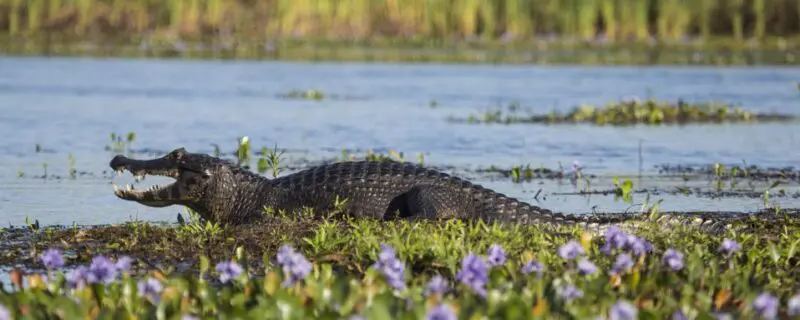
The Ibera Wetlands are home to myriad mammals, birds and reptiles—including caiman like this. JOHN MACGILLIVRAY, DORSEY PICTURES
Connolly takes pity on my encounter and surrenders his turn for me to get on the board and land one of the beasts, so I remain at the bow, scanning the waters ahead as Botha poles us into yet another pool. This time I see a fish surface 30 yards ahead, the boil punctuated by the tail of the fish forking out of the water, revealing a dorado of epic proportions. I drop the fly on the last known location of the fish, twice. Nothing. I try 10 feet to the left and soon the eight-weight is doubled over and so am I. The rodeo begins and I’m determined not to lose this bronc. After a half-dozen jumps, my first dorado is to the boat, a stunning specimen with teeth that look as if it’s been fitted with a piranha smile.
After an hour of testing these waters, Botha starts up the engine of our flats boat and we head up what looks like an old trapper’s trail in some Canadian cattail marsh, the kind a kayak would have difficulty navigating. It’s a three-foot wide cut in an otherwise unending floating matt of vegetation that looks as if it could close behind us at any moment like some kind of cosmic sized venus fly trap. At a few points along the way, we must stop to pole and pull our way through, the journey feeling more like a portage than a float. Eventually, we emerge from the sea of reeds and rushes into a five-acre pool.
“This is it guys, get ready,” says Botha.
I stand and cast to the edge of the reeds, 30-yards to the left. As if a dorado had been waiting for my arrival, it smashes the fly after one strip, trying to kiss the clouds with every jump. Few fish in my experience protest being hooked as much as the golden dorado. Their desire to be free is inspirational, their relationship to a hook being the same as that between cattle and a cattle prod.
Before I can get my fish to the boat, Connolly steps up and hooks a big fish of his own, proving that the journey through our own River of Doubt was worthwhile. The location is rich in golden dorado, numerous fish that act as though they’ve never seen a human or a fly. When they do, they react like a wolf in a trap. By the end of the afternoon, it’s hard not to feel like you’ve just experienced a piece of the planet no one else has ever seen, as close to a moon landing as Connolly and I will ever get. Angling here is not as much about catching fish as it is being captured by the place, a liquid and plant world so unlike anything else save, perhaps, for the great Okavango Delta of Botswana.
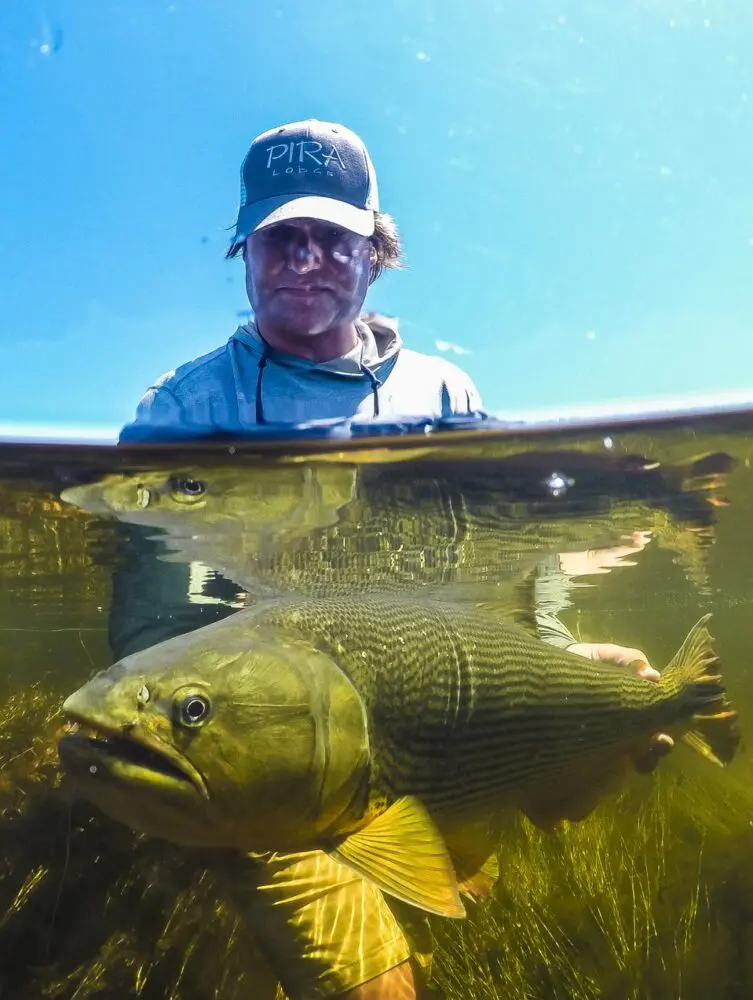
Botha is about to release one of Pira Lodge’s hefty dorado. COURTESY OF FRANCOIS BOTHA
We return to the lodge feeling like the day’s adventure was enough to justify the whole voyage to the other end of the planet. What more could an angler want?
On our last day, Botha takes Connolly and me to yet another of his favorite haunts. After a long journey, we emerge from a screen of reeds to a pool with a series of dead tree stems standing in the midst of the channel, apparently moved there by extraterrestrials because no other tree is visible for miles. As we clear the gray, ghostly branches, Connolly sees a fish 20 yards to the left, drops the fly ahead of the dorado and strips it past its nose. It’s an irresistible presentation and the 10-pound brute hammers the streamer, taking it with him on umpteen jumps.
Seeing that fish, watching Connolly cast to it and ultimately landing that horse of a dorado becomes a postcard moment of the journey. It’s a sight that locks in my mind’s eye where it remains to this day. That’s the way great trips are remembered, in portraits of the mind—sometimes in one uncontrollable laugh or, if you’re lucky, in a kind of epiphany that delivers a yet undiscovered universal truth. After decades of using fish as an excuse to travel, I have my own personal book of fishing revelations, like you can’t have too many flies when fishing for golden dorado…and bring a GPS, just in case.
This article originally appeared in Forbes. Follow Sporting Classics TV host Chris Dorsey at Forbes.
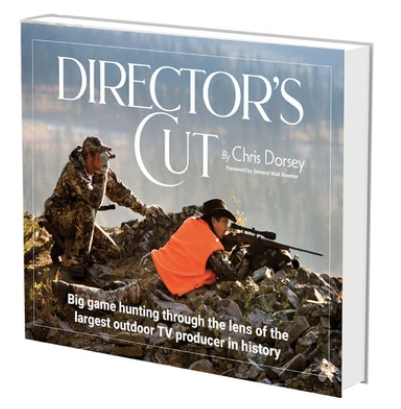 The World Of Sporting Literature Has A New Classic from one of the planet’s most widely traveled hunters. Director’s Cut…Big game hunting through the lens of the largest outdoor TV producer in history, is a book and film production more than 15 years in the making. Author and Executive Producer Chris Dorsey, along with a team of the world’s best sporting life photographers and cinematographers, embarked on expeditions to distant corners of the globe to create an indelible portrait of big game hunting.
The World Of Sporting Literature Has A New Classic from one of the planet’s most widely traveled hunters. Director’s Cut…Big game hunting through the lens of the largest outdoor TV producer in history, is a book and film production more than 15 years in the making. Author and Executive Producer Chris Dorsey, along with a team of the world’s best sporting life photographers and cinematographers, embarked on expeditions to distant corners of the globe to create an indelible portrait of big game hunting.
Dorsey has spent the past 25 years investigating and chronicling the animals, people and unforgettable places home to remarkable big game hunts while producing nearly 60 outdoor adventure television series. In the process, his teams amassed a library of more than 100,000 hours of HD footage and nearly 150,000 photographs, making Director’s Cut (the book and DVD) an unmatched celebration of the world of big game hunting. Buy Now

